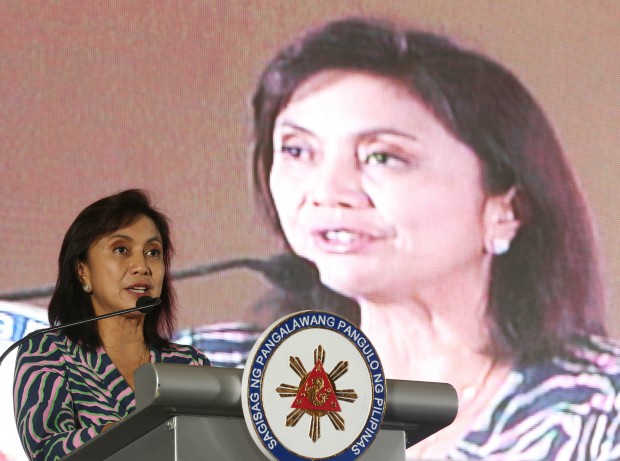Using the Japanese term for “cheers,” President Duterte raised a glass of cider, urged “Kanpai, bottoms up!” to continued friendships at the traditional reception for diplomats to which Vice President Leni Robredo had been invited but later told not to come.
“You know, in the subdiplomatic gatherings, especially in Asia, we just say kanpai. It’s always bottoms up. So be careful with this, our Asian brothers and sisters. When they say kanpai, say, ‘no, just half of the kanpai,’ he said, to chuckles at his first vin d’honneur in Malacañang on Wednesday.
“We believe that friends help each other and utilize constructive engagement to achieve common goals. In truth, we all share the same aspiration of greater peace, progress and prosperity,” the President said in an exchange of toasts with Archbishop Giuseppe Pinto, the Vatican’s envoy and dean of the diplomatic corps.
Robredo’s absence at the reception, attended by Cabinet officials, was reported by
her spokesperson, Georgina Hernandez.
An invitation to the event was sent on Dec. 28, she said. “On Jan. 4, Malacañang called the office to retract the invitation, stating that the guest list was limited.”
Was it a diplomatic faux pas?
“It is a prerogative of the Palace to invite those who they feel is needed to be there,” said Ernesto Abella, Mr. Duterte’s spokesperson.
Robredo, one of the outspoken critics of Mr. Duterte’s war against drugs, resigned as housing secretary after she was told not to attend Cabinet meetings.
She has been accused by Malacañang officials of plotting with the “Yellow” forces of former President Benigno Aquino III to oust Mr. Duterte.
“Usually, disinviting, if it happens, is done quietly,” offered Manolo Quezon, a former Aquino communications undersecretary.
Civility a casualty
Former Vice President Jejomar Binay had been invited to Malacañang receptions, even after he had a falling out with Aquino.
“From the first time Presidents and Vice Presidents did not come from the same party (Carlos P. Garcia and Diosdado Macapagal) and whenever Vice Presidents have parted ways politically with Presidents (Emmanuel Pelaez from Macapagal, Fernando Lopez from Ferdinand Marcos, Salvador Laurel from Corazon Aquino, Teofisto Guingona from Gloria Macapagal-Arroyo), civility between the two highest officials has been a casualty—from invitations to simply appearing in the same place,” Quezon said.
“There have been instances when a first lady could disinvite people even after they showed up at Palace events. But normally, petty ostracism from events would be downplayed by both sides and restricted to gossip,” he said.
Mr. Duterte used the occasion to renew his commitment to fight “three basic evils”—drugs, corruption and criminality.
Among the ambassadors present were Sung Kim of the United States, Zhao Jianhua of China and Igor Khovaev of Russia.
There was no blast against the United States in Mr. Duterte’s usually expletive-laden speech.
He stuck mostly to his prepared speech, and only deviated from it toward the end when, after downing a glass of cider, he said, “Kanpai!”
